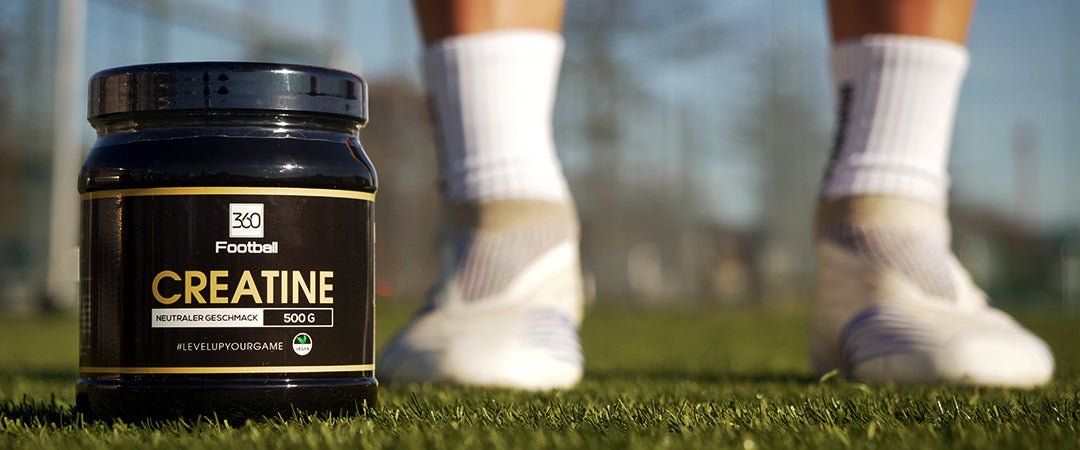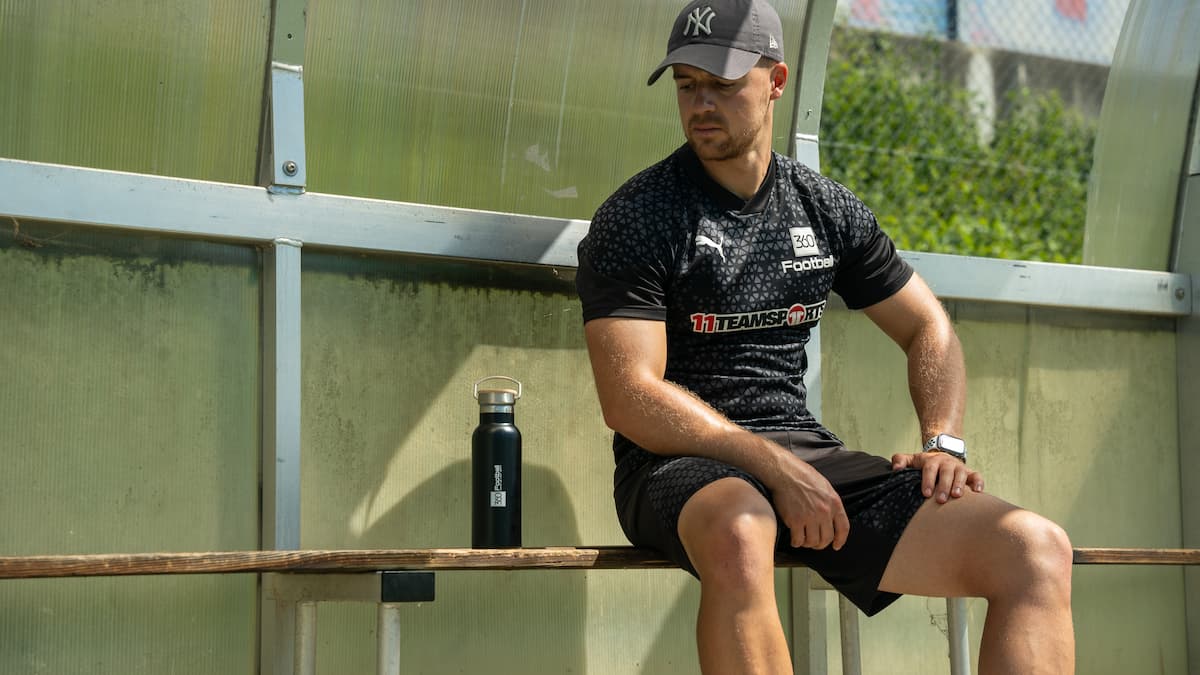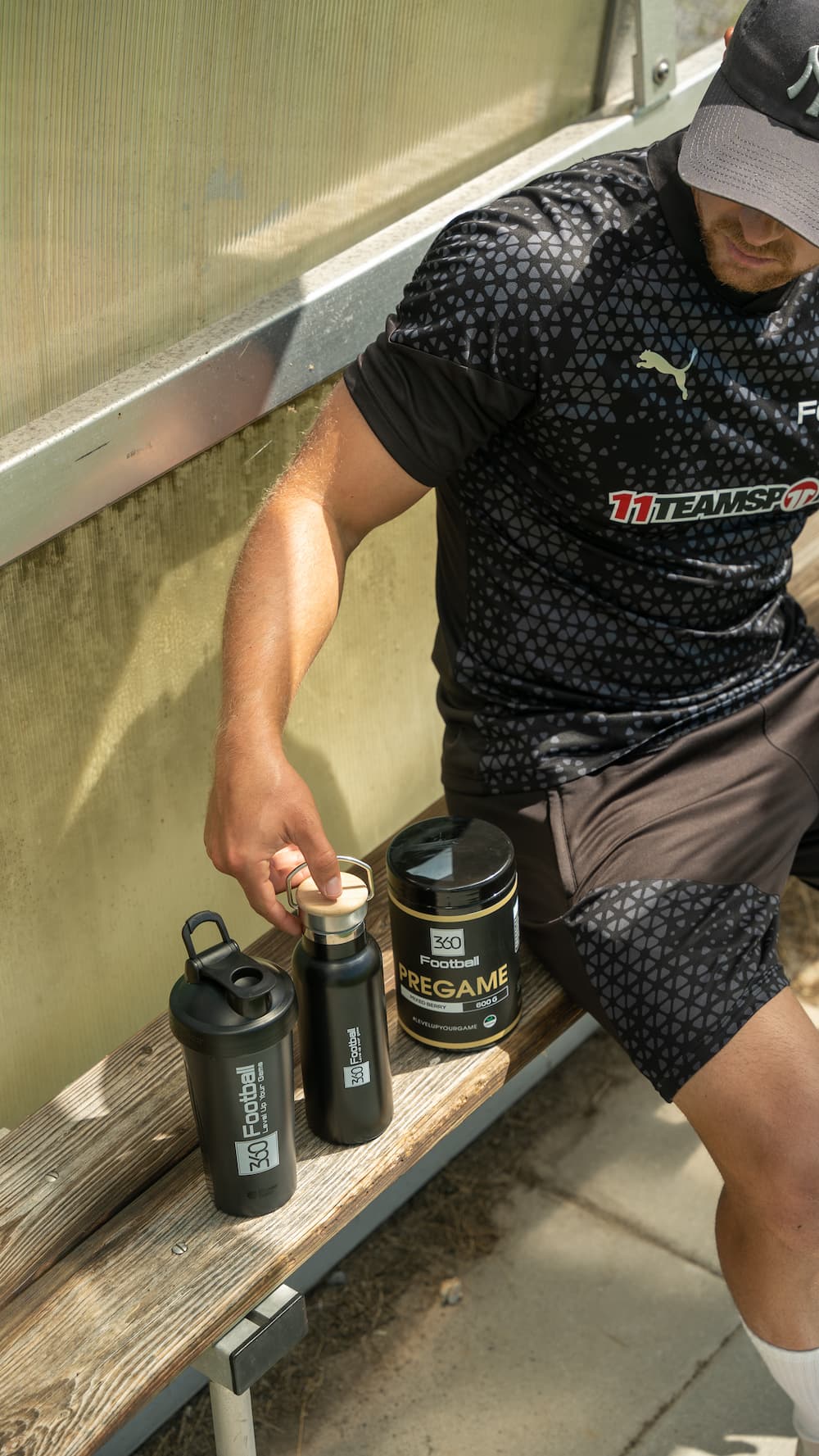The issue of creatine divides opinion in the field of sports. Some see creatine powder as a strength booster , which is a must for athletes. Others, however, claim it causes damage to the liver and kidneys. Both of these opinions are always represented in media reports and blog posts on internet portals and therefore many athletes, including many footballers, find it difficult to form a well-founded opinion on this topic.
Creatine is an endogenous substance that is synthesized primarily in the liver and fulfills a transmitter function for phosphate groups and plays a central role in providing the body with energy. It is stored in the muscles in the form of creatine phosphate. This creatine phosphate comes into play especially when short, high levels of effort are required. The characteristic of creatine phosphate is that although it can be accessed extremely quickly, the stores are emptied after a few seconds of maximum exertion and have 3-5 minutes to be completely filled again and can therefore be accessed. Here we come to the crux of the matter. The supplementation of 3 grams of creatine, in the form of creatine monohydrate, allows the body to provide energy in the creatine phosphate storage area for a few seconds longer before it has to resort to the glycogen storage reserves.
But why should I take creatine as a footballer? How does that help me?
Although football is primarily an endurance sport, the game is peppered with many short, high-intensity intervals in the form of sprints, jumps, physical tackles, dribbling and shots on goal. Therefore, the body would logically have to repeatedly rely on the creatine phosphate stores to provide energy. But what does the study say about this?
Almost all of the notable papers that examined the effectiveness of the supplement in footballers show a positive effect of taking creatine monohydrate on a wide variety of parameters. For example , in 2004 Ostojic conducted a study with 20 Yugoslavian youth players in their first league. He divided the 20 players into a placebo and a CM (creatine monohydrate) group, whereby the placebo group only took sugar pills instead of the supplement, which, however, were visually identical to the creatine pills of the intervention group. Before the intervention, i.e. the administration of the creatine and sugar pills, he carried out the following tests with each player:
- SDT test – i.e. a “specific dribble test” (dribbling test)
- PT test – i.e. a “power test” (sprint test)
- VJ test – i.e. a “vertical jump test” (jump test)
- Shuttle Run – an “endurance test”
The players then continued their weekly training as normal, with the diet of all players being exactly the same in order to allow as few disruptive factors as possible. Seven days after the start of the intervention, so-called re-tests were carried out, i.e. the tests were carried out again 1 to 1.
The placebo group deteriorated minimally in each of the tests, except the endurance test. On the other hand, the CM group showed a significant improvement in the measured values in all tests except the endurance test. The average time in the dribbling test improved by a full 3 seconds and in the sprint test there was an average improvement of 0.5 seconds. In addition, the average jump height of the “vertical jump test” increased from 49.2cm to 55.1cm, showing an improvement of a full 6.3cm. In addition, the creatine group was able to achieve significantly better results in the tests than the placebo group in all tests except the endurance test.
This study in particular has an extremely high dose of 30 grams daily, which seems very special. However, this was only chosen so that a very short intervention time was set. However, the review of existing papers by Juan Mielgo-Ayuso et al. 2019 clear significant improvements in the performance of football players when taking 20-30g of creatine monohydrate over 7 days , followed by a 9-week intake of 3-5g (however, from a legal perspective we can only recommend a daily amount of 3g) . There are several other studies that showed almost identical results
The following graphic is intended to show another example and is from the study by Aquiles Yáñez-Silva et al. At the top it shows the change in the “peak power output” , i.e. the maximum performance of the placebo group and the creatine group, and at the bottom the “ mean power output” , i.e. the average power, in a bicycle ergometer test. In both graphs a significant improvement in the creatine group can be seen.
 Image source: Aquiles et. al. 2017
Image source: Aquiles et. al. 2017
This would therefore clarify the positive effect of creatine supplementation on physical performance in footballers. But what about health? Is creatine harmful to the body?
The current study situation clearly shows that there is currently no evidence of any negative physical effects from taking high or low doses of creatine monohydrate. This is shown, for example, in the very detailed review by Andrew Shao et al. 2006 .
However, one final question needs to be clarified. Can enough creatine be consumed through food? The answer here is clearly no , as it occurs in too small a concentration in our food.
Based on the facts mentioned, we recommend that every footballer take 3g of creatine monohydrate daily in order to improve your strength and power , i.e. your sprint speed and your jumping ability, according to the motto: Level up your game
Referenced sources on the topic of creatine in football:
- Aquiles Yáñez-Silva, Cosme F. Buzzachera, Ivan Da C. Piçarro, Renata SB Märzio, Luis HB Ferreira, Steven R. McAnulty, Alan C. Utter and Tacito P. Souza-Junior. Effect of low dose, short-term creatine supplementation on muscle power output in elite youth soccer players. Journal of the International Society of Sports Nutrition 2017
- Juan Mielgo-Ayuso, Julio Calleja-Gonzalez, Diego Marqués-Jiménez, Alberto Caballero-García, Alfredo Córdova and Diego Fernández-Lázaro. Effects of Creatine Supplementation on Athletic Performance in Soccer Players: A Systematic Review and Meta-Analysis 2019
-
Sergei M. Ostojic. Creatine Supplementation in Young Soccer Players
International Journal of Sport Nutrition and Exercise Metabolism 2004
-
P Cancela,C Ohanian,E Cuitino,AC Hackney. Creatine supplementation does not affect clinical health markers in football players, Br J Sports Med 2007
-
Andrew Shao, John N Hathcock. Risk assessment for creatine monohydrate, Council for Responsible Nutrition, 1828 L St., Washington DC, 2006



